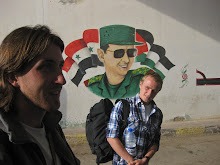It's interesting to witness the growth of "underground" culture in Tunisia, or Tunis at the very least. I was at a concert last night at the École Nationale de l'Architecture et de l'Urbanisme (ENAU) in Sidi Bou Saïd, one of the more affluent suburbs north of the center of Tunis, where I found, before the mesmerized bobbing heads of young architecture students draped in empty dreadlock hats, a Canadian woman rocking anti-war songs with more than a mild Bob Marley flavor. Her pale dreadlocks were bound up in black cloth, and the beard of the drummer behind her tastefully overgrown. This was a better-off section of Tunisia's growing underground culture and music scene, which includes reggae.
But the university students packed the small courtyard in which she played, waving hands and heads, plugged in to her songs, which, being in English, may not have been understood by all (Hell, I didn't make out a lot of what she sang.) But the spirit of the music, which was defiant and overtly political, was lost on no one. And yet, the middle-class youth, most of whom who have been little-touched by the economic--and political?--woes of Tunisia before and after its national uprising, cheered her on as if she sang their class demands out loud (I realize, however, that many of the students come from elsewhere in Tunisia, including the generally impoverished interior regions. However, I don't think it would be way off to say that even those hailing from poor interior towns come from the local middle-classes or petty bourgeoisie, considering the kind of means it would require to put them up for several years in Tunis while at school. This is obviously a very general impression. Correct me if I'm wrong.)
What she was certainly connecting to, however, appears to me a general anti-authoritarian impulse among the students, who lived much of their lives under the silent iron grip of former president Ben Ali & Co., who participated in the protests of December 2010 onwards that precipitated in Benny boy's downfall, and who are now witnessing an elite battle in the halls of power with Islamists, old-regimers, and lefties that is keeping the economy stagnant and freedom of expression precarious.
This impulse was illuminated even more so by the following act, whose name I didn't catch. A proper band this time, also smelling strongly of reggae, I found myself really engaged by the singer/rapper's lyrics. Though they were all either in Standard or Tunisian Arabic, I was able to catch some song titles like "خدّام أوزينة" of Factory Worker in Tunisian dialect, and the lead vocalist's dedication of the songs to the "poor, the factory workers in Redyef, in Kasserine, Gafsa, and Sidi Bouzid (Where the Tunisian Revolution began)." I often heard him spit the word rāsmēlia (capitalism) over hid thickly-bearded face in his mildly Jamaican-sounding sing/raps. Exactly what his comments about capitalism were I couldn't tell you, but judging by his song titles, it was likely not positive. I don't think he was championing an international socialist revolution, as I've noticed a prominent anarchist bent among a lot of the hip hoppers (part of the underground) I've met with, but this was certainly an anti-business-as-usual concert.
Something else to note is the unusually high-level of pan-African sentiment I see displayed among Tunisian youth in the underground. The following act was a band called Mama Africa. Normally made up of 7 members, all from West Africa, only three played that night: one from Senegal, one from Guinea, one from Mali. They were pure percussion and vocals, complete with the hip too-modern dyed-blond hair or flat brim baseball hats. Though they were not Tunisian, and singing in West African languages which the audience DEFINITELY did not understand, the young architects when wild. The whole crowd shook in sync with the complex rhythms of Mama Africa's drums, and endlessly sung back choruses the band shouted over their drums, IN LANGUAGES THEY HAD NO KNOWLEDGE OF (Bambara? Wolof? Serer? Fulani?). After Mama Africa wrapped up a half dozen pounding pieces, the audience kept chanting one of their call-and-response choruses for a couple minutes until Mama came back on and did a messy quasi-encore. This surprised me for sure, for I often hear Tunisians speaking about "the Africans" as something else, separate from themselves but on the very same continent. Along with widespread acceptance among locals of their Berber (indigenous non-Arab) origins, and this limited but enthusiastic acceptance and solidarity with black non-Tunisin Africans, I was starting to feel as if the plates of Tunisian identity were beginning to shift under my feet in post-Ben Ali society.


No comments:
Post a Comment